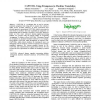Free Online Productivity Tools
i2Speak
i2Symbol
i2OCR
iTex2Img
iWeb2Print
iWeb2Shot
i2Type
iPdf2Split
iPdf2Merge
i2Bopomofo
i2Arabic
i2Style
i2Image
i2PDF
iLatex2Rtf
Sci2ools
105
click to vote
AINA
2010
IEEE
2010
IEEE
CAPTCHA Using Strangeness in Machine Translation
— CAPTCHA is a technique that is used to prevent automatic programs from being able to acquire free e-mail or online service accounts. However, as many researchers have already reported, conventional CAPTCHA could be overcome by state-of-the-art malware since the capabilities of computers are approaching those of humans. Therefore, CAPTCHA should be based on even more advanced human-cognitive-processing abilities. We propose using the human ability of recognizing “strangeness” to achieve a new CAPTCHA. This paper focuses on strangeness in machine-translated sentences as an example, and proposes CAPTCHA using Strangeness in Sentences (SSCAPTCHA), which detects malware by checking if users can distinguish natural sentences created by humans from machinetranslated sentences. We discuss possible threats to SSCAPTCHA and countermeasures against these threats. We also carried out basic experiments to confirm its usability by human users. CAPTCHA, advanced human cognitive processing abi...
| Added | 10 Jul 2010 |
| Updated | 10 Jul 2010 |
| Type | Conference |
| Year | 2010 |
| Where | AINA |
| Authors | Takumi Yamamoto, J. Doug Tygar, Masakatsu Nishigaki |
Comments (0)

